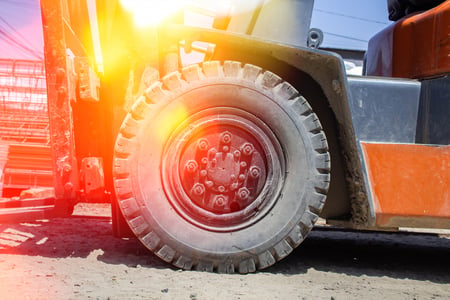 When you're investing in maintenance for your forklift vehicle fleet, you can't afford to overlook the tires. These vehicles spend all day, every day driving around on their tires. Selecting the right forklift tire type and keeping those tires in top condition are therefore important tasks for ensuring good overall performance.
When you're investing in maintenance for your forklift vehicle fleet, you can't afford to overlook the tires. These vehicles spend all day, every day driving around on their tires. Selecting the right forklift tire type and keeping those tires in top condition are therefore important tasks for ensuring good overall performance.
The importance of taking care of forklift tires and wheels
Forklift tire upkeep is important from an uptime and efficiency perspective. After all, a tire failing during a shift can lead to unplanned downtime and relatively costly emergency maintenance.
Many of the dangers facing forklift tires are based around not paying enough attention. For instance, a failure to check for debris being stuck to a vehicle's wheels could lead to that material causing more damage over time. Furthermore, failure to enact forklift tire replacement on time or to equip a forklift vehicle with the right type of tires for its environment can set that lift truck up for failure.
Forklift downtime is costly for several reasons. Your company not only pays for the repairs, but also the lost productivity of an out-of-service material handling vehicle, and salary for an idle forklift operator with no lift truck.
How to choose the right type of forklift tires and wheels
Getting ahead of that potential downtime means taking an active approach to forklift tire upkeep, and that starts with picking the right tire for a given role. While not every kind of forklift will work with all forklift tires, you do have options.
Factors to consider include the amount of time the forklift will be in use during a given day, along with the amount of debris it will have to contend with on the floor. Extreme temperatures also merit consideration: Will your forklift be expected to operate in an ambient temperature warehouse featuring a variety of climates?
The following are six types of tires, along with the defining characteristics that might make you pick each kind.
Pneumatic tire
A very common tire type that closely resembles a car tire, pneumatic forklift tires are found as default equipment on many forklifts. There are a few varieties of pneumatic tires — while some are filled with air, others are solid rubber tires.
Pneumatic tires in general provide strong traction and toughness across different driving surfaces. These traits have made them popular with operators. If your job site has a high potential for tire damage, for instance, if there is often debris such as nails or sharp rocks in vehicles' paths, you can turn to solid pneumatic tires, which are especially durable.
Cushion tire
Cushion tires are another common tire type. These are filled with air and designed for lighter duty than pneumatic forklift tires. It's worth noting that pneumatic tires and cushion tires are not interchangeable. Forklifts are designed for one type and can't use the other without adjustments.
Cushion tires, due to their lighter-duty profile, are best used in indoor warehouse operations. Outdoors, these tires should likely be kept off rough terrain and restricted to use on smooth asphalt. These tires are often chosen for vehicles such as golf carts that don't have to carry the same heavy loads as forklifts.
Static-resistant tire
Static-resistant tires are a specialty model of tire designed to work in environments with high amounts of stored energy. In workplaces where it's unsafe to introduce extra heat or electricity sources, these tires' ability to minimize static discharge becomes important.
Polyurethane tire
Polyurethane can hold its shape longer than rubber, even when exposed to stress. This extreme endurance means polyurethane tires are a great choice when forklifts have to move heavy loads over short distances, and in environments where there are hazardous chemicals around.
Cold-storage tire
Sporting a special surface that resists moisture and prevents ice buildup, cold-storage tires are perfect for forklift vehicles used in cold storage settings. Trying to use normal forklift tires in cold conditions can cause ice to form on the wheels, reducing traction and raising the chances of an accident.
Fiberglass reinforced tire
Since fiberglass can stand up to heat better than rubber, a rubber tire reinforced with fiberglass can be the perfect choice for hot work environments. Too much exposure to heat can cause a standard rubber to break down at an accelerated pace, making fiberglass infusion a good option.
Forklift tire and wheel upkeep as part of forklift maintenance
Essential forklift wheel and tire maintenance go beyond choosing the right tires. Other equipment related to the wheels, such as the bearing systems, is just as important. Personnel should also keep a close eye on vehicles over time to keep their wheels in top shape.
As part of an overall proactive maintenance plan, employees should:
-
Check tire wear indicators to see if it's almost time for rubber tire replacement.
-
Inspect wheels for debris that may have accumulated such as shrink wrap.
-
Grease joints and bearings to prevent overheating.
Forklift service and proactive maintenance doesn't stop with checking for worn tires. By clearing work areas of any debris such as broken pallets or loose shrink wrap, technicians can protect vehicles and extend tire life.
There are many different maintenance arrangements available, depending on how many vehicles you are operating, your material handling schedule and more. You can even have a dedicated technician sent to your facility to oversee forklift tire maintenance and all aspects of vehicle operation. Reach out to learn more.


 Ryan Lynch
Ryan Lynch
